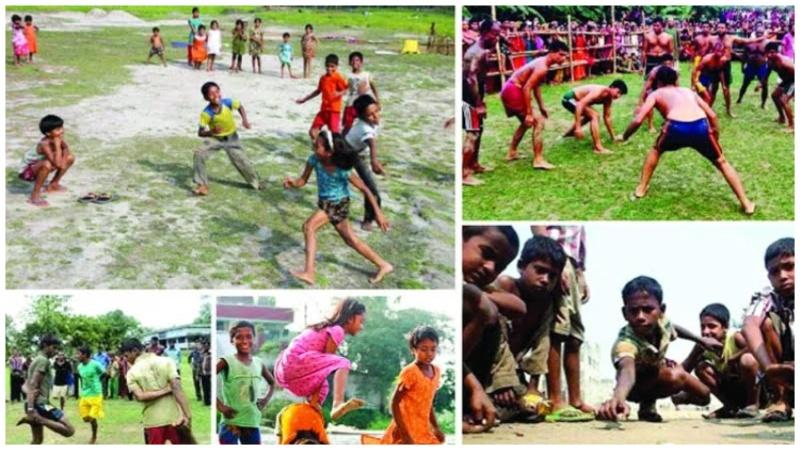Rural games are in the book, not in the field

The proverb "Kazir goru ketabe ache, gowale nei." (Kazi’s cow is in the book, but not in the cowshed) holds entirely true in the realm of rural sports in the country. It means that what you may find written in books may not actually exist in reality.
In 2022, the National Sports Council (NSC) announced three paragraphs of sports policies, mentioning rural sports in the country. Many once widely discussed sports are now only imprisoned within the pages of books, with no real discussion about them. There's also no initiative to save these sports.
Rural sports have been gradually fading away. As a result, games like "Kanamachi," "Bouchi," "Ha-du-du," "Gollachhut," "Danguli," "Marble," "Rashitana," "Itching-bitching," "Open to Bioscope," "Mallayudh," "Lathi Khela," "Dariya Bandha," "Hide and Seek," "Cockfight," "Kodi," "Dhappa," "Kutkut," "Putuler Biye," "Choruibhati," "Elading Belading," and "Sat Chara" are becoming incomprehensible to the present generation.
According to paragraph 30 of the sports policy, it is stated, "Efforts will be made to promote traditional sports events and festivals in Bengali language, with the aim of revitalizing the hidden heritage in Bengali, for the formation of a healthy and mentally strong nation." However, in practice, this aspect of the policy is not being adequately implemented.
The unfortunate fact is that despite being neglected, these traditional games are still widely popular. There is still a significant interest surrounding the organization of such games in the rural areas across the country. In 2021, Narayanganj Sadar Upazila administration organized a boat race event, which serves as evidence of this enduring popularity. Thousands of people have gathered on both banks of the Dhaleshwari River from Dharmaganj in Sadar Upazila to Khayaghat in Dikrirchar to witness the boat race event. It's noteworthy that enthusiastic crowds have also been seen participating in the festivities with motorized boats. Despite its immense popularity, such events have not been organized regularly. The exact reasons behind the lack of continuity in organizing these events are unknown to the organizers. The initiative to preserve rural sports in various parts of the country has not been taken due to the lack of attention from the responsible authorities of the country's sports arena.
According to the National Sports Council's Sports Department, various plans have been undertaken to preserve rural sports at the governmental level, including allocating separate funds for this purpose in each budget. However, despite these efforts, the lack of discussion and initiatives regarding rural sports persists. The reasons behind the lack of attention or initiatives to preserve fading rural sports remain unknown to the relevant authorities.
The neglect of rural sports is evident even within the jurisdiction of the Ministry of Youth and Sports and its controlled institution, the Sports Directorate. In the announced sports calendar for the 2023-24 season, there is no mention of any rural sports events. Instead, detailed information about 41 sports events is provided across 8 pages of the calendar, with no initiative mentioned for organizing any rural sports event. Under the jurisdiction of the Sports Directorate, institutions like the District Sports Office can organize rural sports events. Even according to the vision of the directorate, it is stated, "Through the expansion of sports at the grassroots level, empowering the youth generation in sports and transforming them into skilled human resources through extensive sports discussions."
The Bangladesh Olympic Association (BOA) used to organize rural sports events. In 2008, a divisional event was held in Rangpur, attended by 25-30 journalists from various media outlets in Dhaka. Witnessing that event was a memorable experience for me as well. The former officials of BOA were also impressed by the event. They promised that the initiative to promote rural sports discussions would continue progressively. However, that continuity has not been maintained.
The sports that were once an integral part of life are now much less frequently organized, especially on special occasions. In 2023, Dhanmondi Society organized rural sports as part of the Victory Fair. Events like boat racing, kabaddi, ha-du-du, stick fights, and ball games were organized as part of the celebration. However, these events were limited to a specific area.
Some popular rural games:
"Ekkadokka" is a game played among girls. It involves drawing a small court on the ground using chalk or by creating boundaries with small pieces of broken clay pots. The court is usually rectangular or circular in shape. Players take turns hopping or jumping into each section of the court following specific rules, often while chanting rhymes or counting. It's a traditional game enjoyed by girls in rural areas and promotes physical activity and social interaction.
"Gollachut" is a game that requires a large open space for running and playing. It is played between two teams with an equal number of players. The number of players on each team can range from 4 to 6 or 8 to 10 individuals.
"Danguli" is a game that involves two main items - one is a stick (dang) that is about one and a half to two feet long, and the other is a small stick called "guli," which is approximately two inches long. The guli has slightly tapered ends. The players divide into two teams, with two to five or six players on each team. The small hole and the guli are placed on the ground, and one team tries to hit the guli with the stick to make it fly away. The opposing team's players stand around the hole, attempting to catch the guli in the air. If they successfully catch it, the player who hit the guli is out.
"Iching-Biching" was a popular rural game not only in Bangladesh but also in the Indian subcontinent. Typically, green fields are used for this game. Height surpassing is the main characteristic of this game. Two players sit side by side, building height to surpass the opposing players. Gradually, increasing the height makes it difficult to surpass, adding to the challenge of the game.
"Open to Bioscope" is a game where the leaders of two teams choose the names of their teams based on flowers or fruits. They face each other and build a structure resembling a train track by holding each other's shoulders and walking in a line. Eventually, the player who breaks the structure during the journey is considered "captured," and they are asked which team they want to join. They join their preferred team, and then the main game begins with the formation of teams.
Kardi Game: Points are collected by rolling four kardis from the hand on a smooth surface and tapping them in pairs. Failure to hit or if the links stick together forfeits that player's turn. Then someone else starts playing.
"Kanamachi" is a game where one player covers the eyes of another player with a piece of cloth. The player whose eyes are covered tries to catch the other players, who are known as "machhi" (flies). The flies move around the blinded player, tapping them on the head or shoulders, trying to avoid being caught. If the blinded player manages to catch someone and correctly identifies them by name, that person becomes the next blinded player.
"Lathi Khela" is a traditional martial art. The player in this game is called a "lathiwal." The lathi, or stick, used in this game is typically around four to five feet long and is made of bamboo. Each player demonstrates various exercises using their own stick.
"Kutkut" is a traditional game where initially 7-8 squares are drawn on the ground, with the last one being in the shape of a semicircle. A player throws a small object into the first square, then hops into the square on one foot to retrieve it. The player continues to hop through all the squares, picking up the object each time until they reach the semicircular square. From there, they toss the object back into the first square and hop back, trying not to step on the lines or lose balance. If successful, they continue the game; otherwise, their turn ends.
"Shadher Laddai" is a traditional Bangladeshi game where two oxen (shad) are pitted against each other in combat. Spectators gather around, beating drums and singing songs to encourage the oxen. The oxen then charge at each other, trying to butt their opponent with their horns. The Ox that successfully knocks down its opponent is declared the winner and is adorned with a prize around its neck. The festivities continue with celebrations and displays in the local area.
In the game of "Bouchi," two teams consisting of 8 to 10 players each participate. The teams create two houses by cutting marks on the ground at a distance of 20-25 feet. The team that gets the opportunity to play first selects a "Bou" (bride) from among themselves. One of the houses is larger, where all players except the "Bou" stay. The "Bou" stays in the smaller house. The outcome of the game depends on the skill of the "Bou." The "Bou" must run from her house to the larger house. If any player from the opposing team touches her outside her house, the game ends in favor of the touching team.
In the game of "Dariyabandha," the field is 50 feet long and 20 feet wide. In the middle, there will be a line parallel to the longer side, 50 feet long and 1 foot wide. The entire court will be divided into 10 squares by parallel lines across the field. Each of the parallel lines is 6 feet wide. Six players from each team participate. The attacking and defending players are chosen by a toss. After 25 minutes of play, there is a 5-minute break, followed by another 25 minutes of play. Players attempt to move from one square to another within the line of 1-foot width, while players from the opposing team try to prevent them from doing so.
"Noukabaich" is a competition of boat racing on the river. A team is formed with a boatman as the captain. Boat racing competitions are held among many teams. The boat that reaches the finishing line first is declared the winner.
"Ha-du-du" is a game played between two teams consisting of 8-10 players each. One team will be positioned within a designated court. A player from the opposing team comes to raid inside that court. If the raider manages to touch any player from the opposing team and return to their court without being caught, they earn a point. On the other hand, if the defenders can hold the raider, they also earn a point. There are variations in the rules of this game in different regions. At the national level, international rules are usually followed. This game is known as "Kabaddi" in Bangladesh, which is the national sport of the country.


Leave A Comment
You need login first to leave a comment